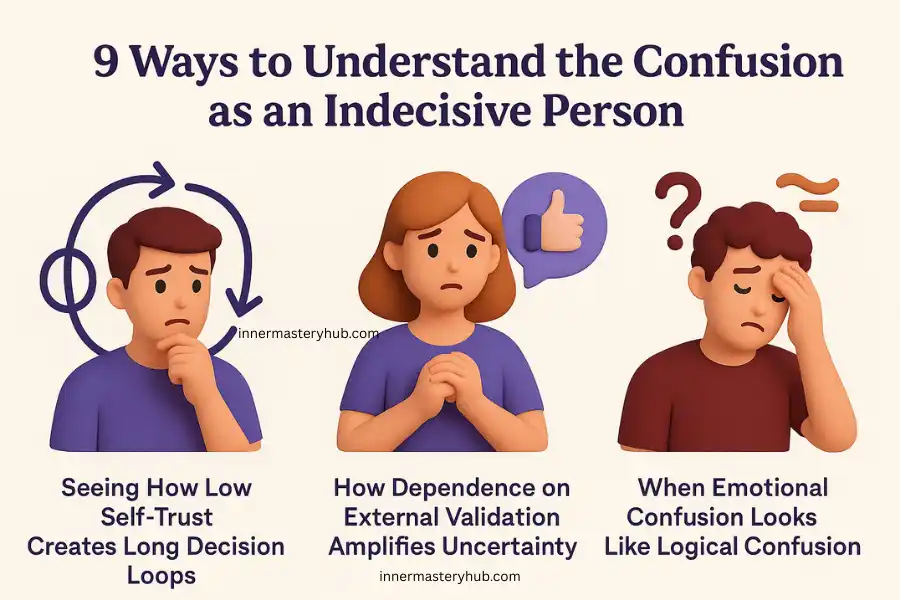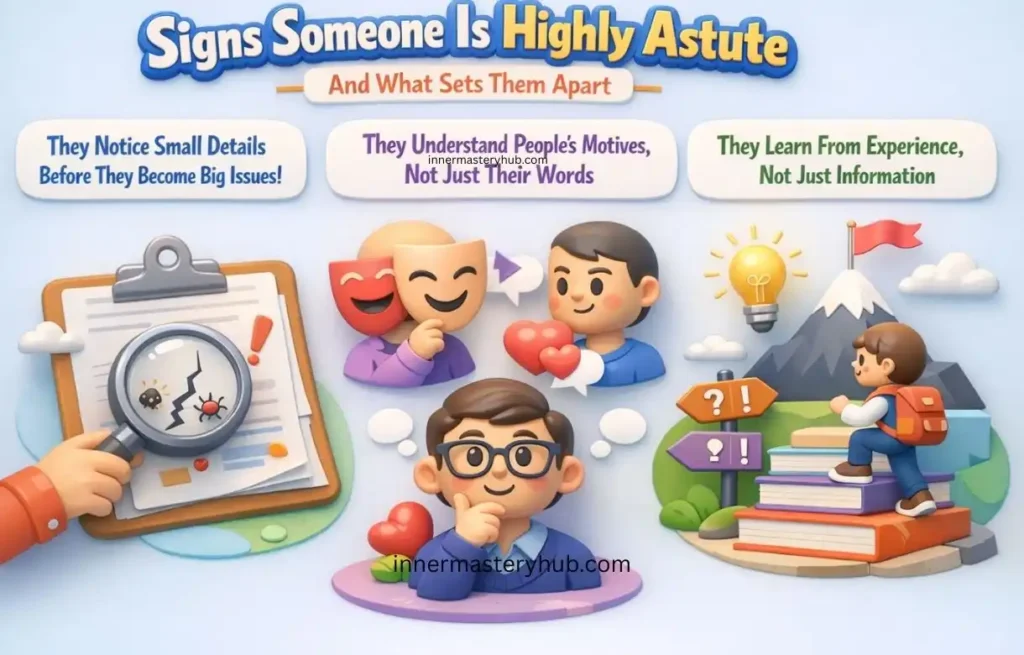The Indecisive Person: Stuck Between “Yes” and “No”

You may already be familiar with the sense of being the indecisive person in day-to-day life if you regularly delay, reconsider, or go in circles before making even the slightest decision. Even though you know you’re intelligent, capable, and conscious, making judgments drains you far more than they should.
You might secretly wish you understood why, even when the solution appears clear to others, you are still confused. The first step to gaining more Clarity is realising what causes this mental fog. As you investigate, you start to see patterns you were previously unaware of. It’s only when you understand your own confusion that you can see the way out of it.
9 Ways to Understand the Confusion as an Indecisive Person
1. The Fear of Negative Outcomes Clouds Your Thinking
The continual fear of what could go wrong is a significant contributing factor to the weight of decisions. Research in cognitive psychology shows that humans instinctively attach more weight to potential losses than to possible gains. Behavioural economics research demonstrating that avoiding losses feels more important than gaining anything new supports this theory, known as loss aversion.
Such a tendency makes neutral decisions seem risky as you approach them. You may have such vivid images of shame, disappointment, or remorse that your thoughts freeze before you act. Even if you know the worst-case scenarios are unlikely, you can find that you keep thinking about them.
Perhaps one minor detail made you hesitate before making a purchase, sending a letter, or deciding on a life course. It gets tiresome with time. You are trapped analysing every possibility while others advance swiftly. This indicates that your mind is attempting to protect you, even if the protection seems overwhelming, rather than that there is a problem with you.
You start to perceive your confusion differently when you become aware of this innate bias. You realise that your brain is just programmed to overvalue safety rather than thinking you’re stupid.
2. Seeing How Too Many Options Increase Confusion
There are always more options to choose from, whether it’s relationships, food, jobs, or hobbies. According to research by psychologist Barry Schwartz, having too many choices can lead to boredom and lower levels of happiness. What was meant to provide independence ends up being stressful. You most likely have strong feelings about being an indecisive person.
You might browse streaming services until you’re so exhausted you give up, or you might open a menu and feel overwhelmed. The more possibilities you see, the more concerned you are that you could overlook the finest one. Your mind searches for every detail, compares everything, and forecasts unpredictable future events. Decisions become more difficult as a result.
3. Noticing How Past Experiences Shape Your Reactions Today
Confusion doesn’t just happen. You’ve experienced things that have influenced the way you make decisions now. Perhaps you grew up in an environment where making errors was frowned upon or where doing things “the right way” was necessary to be accepted. Maybe someone made you believe that your judgment was inadequate, or perhaps decisions you made in the past resulted in painful consequences, and the experience stuck with you.
Emotional experiences—evil ones—become easier to remember than neutral ones. Even when the circumstances are unconnected, this might lead to a propensity to link current choices with previous mistakes. Because your mind recalls the pain of past mistakes, you may freeze before making a decision.
When you reflect on this pattern, you start seeing that your hesitation is not a lack of ability—it’s a learned protective habit. This awareness helps you let go of old expectations and make room for choices based on who you are now, not who you were then.
4. Perfectionism Intensifies Your Doubt
Unknown to you, perfectionism gradually increases confusion. You convince yourself that you only want to make a “good choice,” but the pressure to choose the ideal option usually lies beneath that desire. Clinical psychology research on perfectionism reveals that it is associated with anxiety, overthinking, and trouble finishing activities. Every decision feels like a test you have to pass when perfection is accepted as usual.
You become aware of this when you take too long to write text messages or keep reassessing decisions you’ve already made. Because you’re waiting for Clarity that never comes, you can even put off making decisions. Small mistakes seem larger because of this expectation of perfect results.
As you understand this, you start recognizing that perfectionism doesn’t lead to better outcomes; it simply steals your ability to trust yourself. Releasing the idea that choices must be perfect opens the mental space you need to move forward.
5. Overthinking Drains Your Mental Energy
Not only does overthinking impair decision-making, but it also increases confusion by tiring you out. Working memory has its limits, and it becomes more difficult to comprehend information clearly when it is overloaded with ideas. You most likely have a running list of advantages, disadvantages, hypothetical scenarios, and emotional responses when you are a person who struggles to make decisions.
Your mind gets cluttered while you go through this internal dialogue. You wander farther away from a conclusion rather than closer to it. You even begin to wonder about topics you didn’t find confusing at first. Simple chores become difficult due to the resultant mental exhaustion.
Reflecting on this pattern helps you understand that confusion comes from mental overload rather than a lack of intelligence. When you learn to pause, simplify, or write things down, you create Clarity by freeing space in your mind.
6. When Emotional Confusion Looks Like Logical Confusion
Sometimes it’s difficult to decide because of conflicting emotions rather than unclear possibilities. Research in psychology suggests rational and emotional processes cooperate rather than operate independently. You can think you’re confused about the facts when, in reality, you’re not sure how you feel if your emotions—such as fear, enthusiasm, hope, or doubt—are unclear.
For instance, even if a job offer seems reasonable, you may be reluctant to take it. It’s possible that you’re confused about whether you’re prepared for the move rather than money, hours, or location. Alternatively, even if a personal decision is necessary, you can put it off to avoid offending someone.
Know that the emotional layer of confusion helps you see that hesitation is a sign of inner conflict, not poor reasoning. When you become honest about your feelings, your decisions become clearer.

7. Dependence on External Validation Amplifies Uncertainty
Making decisions becomes more difficult if you’re accustomed to getting permission before taking action. Social psychology research shows that people often change their choices when they anticipate criticism or assessment from others. You may find it difficult to trust your own viewpoint if you constantly seek out other people’s ideas or compare yourself to them.
Once someone else agrees with you on a decision, you could realise that you feel more confident. Alternatively, you can feel trapped because different people have conflicting advice. Your decision-making process gets more complicated the more people you include.
Learning to notice this pattern helps you see how much of your hesitation stems from trying to meet expectations that aren’t your own. When you begin making choices based on your values rather than others’ reactions, the weight of confusion becomes lighter.
8. Low Self-Trust Creates Long Decision Loops
Making decisions requires a great deal of self-confidence. People with greater self-confidence tend to make decisions more quickly and consistently because they believe they can handle whatever comes next. Even seemingly insignificant decisions feel dangerous when you have self-doubt.
“What if I’m wrong?” is a common thought. or “What if I later regret doing this?” Long decision loops arise from these questions, in which each choice appears to be both correct and incorrect. You might even be angry at yourself for not knowing what you want.
As you reflect on this, you may realize that you don’t hesitate because you lack knowledge—you hesitate because you question your ability to deal with the outcome. Building trust in your own resilience helps you break these loops and make better choices with more confidence.
9. Small Steps Reduce Confusion and Strengthen Clarity
You may start taking baby steps towards Clarity once you know why uncertainty arises. Tiny actions lead to long-term change in habit formation. You don’t have to change the way you make decisions completely. Instead, begin by simplifying one aspect of your life.
Perhaps you restrict your options when faced with overwhelming circumstances. You may have set a deadline for yourself to make a decision. Maybe you practise making quick, low-stakes judgements to teach your mind that consequences are rarely as disastrous as your imagination suggests. Your brain becomes less responsive over time, making decisions seem more straightforward.
Additionally, you begin to see that Clarity comes from having faith that even flawed choices can lead to significant growth, rather than from complete certainty. You start creating a new identity when you take tiny steps, learning to make decisions with greater confidence and self-awareness rather than being trapped as an indecisive person.
Conclusion
It’s not about blaming yourself for the confusion that comes with being an indecisive person; instead, it’s about identifying the mental, emotional, and environmental factors that influence how you react. You start to see patterns that were previously unnoticeable when you consider the reasons for your hesitation. You discover that being confused does not indicate that you are incompetent; instead, it suggests that your mind is attempting to defend you, sometimes too vigorously.
With this awareness, you can create a life where decisions seem more like possibilities and less like pressure with understanding, patience, and baby steps. One decision at a time can make space for Clarity, self-assurance, and trust as you become more aware of your choices.
FAQs About The Indecisive Person
Why is an indecisive person easily confused?
Because their brain strives to anticipate every scenario, an indecisive person usually struggles with overthinking, which creates uncertainty and confusion. Even straightforward decisions can feel emotionally taxing due to the fear of making mistakes. Over time, noticing this pattern eases strain and facilitates decision-making.
Is being an indecisive person a personality trait?
Indecisiveness may be a personality trait influenced by fear of unfavourable consequences, self-doubt, or past experiences. Though tendencies can be altered with work, some people are inherently cautious thinkers. You don’t have to be indecisive; awareness, self-assurance, and baby steps can help you make better decisions.
What causes an indecisive person to overthink?
Overanalyzing choices to avoid regret is known as overthinking. Decisions become difficult due to cerebral overload. Pressure is also increased by emotional uncertainty. Overthinking becomes easier to handle when you learn to simplify options, trust your judgement, and make decisions in phases.
How can an indecisive person make decisions faster?
Limit your options, set short-term schedules, and exercise by making low-risk choices every day. This teaches your mind to make decisions without overanalyzing. Clarity can also be achieved by putting options in writing. Above all, prioritise progress over perfection; as your self-confidence increases, making snap decisions becomes simpler.
Is being an indecisive person linked to anxiety?
Indeed, anxiety and indecision are related since hesitation is made worse by the fear of making the incorrect decision. Anxiety increases the pressure when your mind predicts bad things will happen. Having a sense of your emotional triggers and mastering grounding skills will help you feel less anxious and make more confident decisions.
How does perfectionism affect an indecisive person?
Making decisions feels like an exam that you have to pass because of perfectionism. You might wait for the “ideal” response, which would cause confusion and delay action. You can break the cycle of perfection and make realistic, self-assured decisions without constant worry by acknowledging that no decision will ever be perfect.
Can an indecisive person learn to trust themselves?
Indeed. Small, regular choices build self-trust. Confidence can be increased by reflecting on past instances when things worked out well, even if they weren’t flawless. Over time, you start to feel more confident in your ability to manage results, which lessens reluctance and makes making decisions seem less daunting.
How does having too many options affect an indecisive person?
Your brain struggles to compare options when you have too many, leading to mental exhaustion. You feel overburdened rather than liberated. Making fewer options, such as choosing between two or three, makes decision-making easier and less stressful.
Why does an indecisive person ask for others’ opinions?
If you’re not sure if your decision is “right,” you might look for confidence. When perspectives diverge, this need for outside approval may make decision-making more difficult. You can stop the cycle and have faith in your own judgement by learning to listen to your values and preferences.
Can an indecisive person improve Clarity in daily life?
Indeed. Slowing down your thinking, identifying emotional triggers, and breaking decisions down into smaller steps all help you become clearer. Making daily decisions is easier when you organise your duties, narrow down your options, and think about what is really important to you.
Why do I struggle with being an indecisive person?
Being indecisive often stems from overthinking, fear of making mistakes, or a desire for the perfect choice. Your brain tries to predict outcomes, which creates stress and hesitation. Understanding why decisions feel risky helps you build confidence and make choices more calmly.
Is being an indecisive person a personality trait?
Being an indecisive person can be a personality trait, but it’s also influenced by stress, upbringing, or lack of experience. Some people naturally analyze more deeply, which slows decisions. With practice and clearer priorities, indecision can improve even if it feels like a long-term habit.
How can I stop being an indecisive person in daily life?
To stop being an indecisive person, start with small decisions and set time limits. Reduce options when possible and focus on “good enough,” not perfect. The more you practice making quick choices, the more natural and less stressful decision-making becomes.
Does being an indecisive person affect relationships?
Yes, being an indecisive person can affect relationships because partners may feel frustrated when decisions take too long. It can lead to misunderstandings or pressure. Clear communication, sharing your concerns, and making small decisions independently can help balance the relationship.






